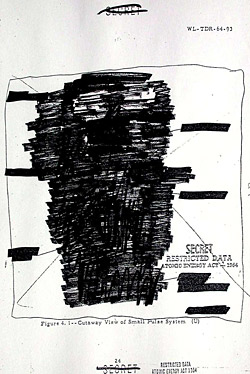Marc D. Hauser, a Harvard biologist, has built on this idea to propose that people are born with a moral grammar wired into their neural circuits by evolution. In a new book, “Moral Minds” (HarperCollins 2006), he argues that the grammar generates instant moral judgments which, in part because of the quick decisions that must be made in life-or-death situations, are inaccessible to the conscious mind.
People are generally unaware of this process because the mind is adept at coming up with plausible rationalizations for why it arrived at a decision generated subconsciously.
Dr. Hauser presents his argument as a hypothesis to be proved, not as an established fact. But it is an idea that he roots in solid ground, including his own and others’ work with primates and in empirical results derived by moral philosophers.
The proposal, if true, would have far-reaching consequences. It implies that parents and teachers are not teaching children the rules of correct behavior from scratch but are, at best, giving shape to an innate behavior. And it suggests that religions are not the source of moral codes but, rather, social enforcers of instinctive moral behavior.
Both atheists and people belonging to a wide range of faiths make the same moral judgments, Dr. Hauser writes, implying “that the system that unconsciously generates moral judgments is immune to religious doctrine.” Dr. Hauser argues that the moral grammar operates in much the same way as the universal grammar proposed by the linguist Noam Chomsky as the innate neural machinery for language. The universal grammar is a system of rules for generating syntax and vocabulary but does not specify any particular language. That is supplied by the culture in which a child grows up.
The moral grammar too, in Dr. Hauser’s view, is a system for generating moral behavior and not a list of specific rules. It constrains human behavior so tightly that many rules are in fact the same or very similar in every society — do as you would be done by; care for children and the weak; don’t kill; avoid adultery and incest; don’t cheat, steal or lie.
But it also allows for variations, since cultures can assign different weights to the elements of the grammar’s calculations. Thus one society may ban abortion, another may see infanticide as a moral duty in certain circumstances. Or as Kipling observed, “The wildest dreams of Kew are the facts of Katmandu, and the crimes of Clapham chaste in Martaban.”
Matters of right and wrong have long been the province of moral philosophers and ethicists. Dr. Hauser’s proposal is an attempt to claim the subject for science, in particular for evolutionary biology. The moral grammar evolved, he believes, because restraints on behavior are required for social living and have been favored by natural selection because of their survival value.
Much of the present evidence for the moral grammar is indirect. Some of it comes from psychological tests of children, showing that they have an innate sense of fairness that starts to unfold at age 4. Some comes from ingenious dilemmas devised to show a subconscious moral judgment generator at work. These are known by the moral philosophers who developed them as “trolley problems.”
Suppose you are standing by a railroad track. Ahead, in a deep cutting from which no escape is possible, five people are walking on the track. You hear a train approaching. Beside you is a lever with which you can switch the train to a sidetrack. One person is walking on the sidetrack. Is it O.K. to pull the lever and save the five people, though one will die?
Most people say it is.
Assume now you are on a bridge overlooking the track. Ahead, five people on the track are at risk. You can save them by throwing down a heavy object into the path of the approaching train. One is available beside you, in the form of a fat man. Is it O.K. to push him to save the five?
Most people say no, although lives saved and lost are the same as in the first problem. [Many other people will ask, though, "Is he really fat enough to stop the train?" And keep their mouths shut about what they'd really do.]
...Why does the moral grammar generate such different judgments in apparently similar situations? It makes a distinction, Dr. Hauser writes, between a foreseen harm (the train killing the person on the track) and an intended harm (throwing the person in front of the train), despite the fact that the consequences are the same in either case. It also rates killing an animal as more acceptable than killing a person.
Many people cannot articulate the foreseen/intended distinction, Dr. Hauser says, a sign that it is being made at inaccessible levels of the mind. This inability challenges the general belief that moral behavior is learned. For if people cannot articulate the foreseen/intended distinction, how can they teach it?
Kind of reminds me of the chemistry teacher who doesn't understand quantum theory...
Dr. Hauser began his research career in animal communication, working with vervet monkeys in Kenya and with birds. He is the author of a standard textbook on the subject, “The Evolution of Communication.” He began to take an interest in the human animal in 1992 after psychologists devised experiments that allowed one to infer what babies are thinking. He found he could repeat many of these experiments in cotton-top tamarins, allowing the cognitive capacities of infants to be set in an evolutionary framework.
His proposal of a moral grammar emerges from a collaboration with Dr. Chomsky, who had taken an interest in Dr. Hauser’s ideas about animal communication. In 2002 they wrote, with Dr. Tecumseh Fitch, an unusual article arguing that the faculty of language must have developed as an adaptation of some neural system possessed by animals, perhaps one used in navigation. From this interaction Dr. Hauser developed the idea that moral behavior, like language behavior, is acquired with the help of an innate set of rules that unfolds early in a child’s development.
Social animals, he believes, possess the rudiments of a moral system in that they can recognize cheating or deviations from expected behavior. But they generally lack the psychological mechanisms on which the pervasive reciprocity of human society is based, like the ability to remember bad behavior, quantify its costs, recall prior interactions with an individual and punish offenders. “Lions cooperate on the hunt, but there is no punishment for laggards,” Dr. Hauser said.
The moral grammar now universal among people presumably evolved to its final shape during the hunter-gatherer phase of the human past, before the dispersal from the ancestral homeland in northeast Africa some 50,000 years ago. This may be why events before our eyes carry far greater moral weight than happenings far away, Dr. Hauser believes, since in those days one never had to care about people remote from one’s environment.
You realize, of course, if it's biological and evolving their is no final shape. Only a current one that changes with selection pressure. If you can select for morality, then under some circumstances you can select against it
 too.
too. Dr. Hauser believes that the moral grammar may have evolved through the evolutionary mechanism known as group selection. A group bound by altruism toward its members and rigorous discouragement of cheaters would be more likely to prevail over a less cohesive society, so genes for moral grammar would become more common.
Still, there are different successful survival strategies that a species can adopt. For example, take the violent, male-oriented chimpanzee family, and compare it to the maternal, affectionate bonobos. Altruism isn't the only group-oriented success strategery
 among human subspecies, either.
among human subspecies, either.Many evolutionary biologists frown on the idea of group selection, noting that genes cannot become more frequent unless they benefit the individual who carries them, and a person who contributes altruistically to people not related to him will reduce his own fitness and leave fewer offspring.
But though group selection has not been proved to occur in animals, Dr. Hauser believes that it may have operated in people because of their greater social conformity and willingness to punish or ostracize those who disobey moral codes.
“That permits strong group cohesion you don’t see in other animals, which may make for group selection,” he said.
His proposal for an innate moral grammar, if people pay attention to it, could ruffle many feathers. His fellow biologists may raise eyebrows at proposing such a big idea when much of the supporting evidence has yet to be acquired. Moral philosophers may not welcome a biologist’s bid to annex their turf, despite Dr. Hauser’s expressed desire to collaborate with them.
Nevertheless, researchers’ idea of a good hypothesis is one that generates interesting and testable predictions. By this criterion, the proposal of an innate moral grammar seems unlikely to disappoint. And once identified, the genes provide a whole new way to discriminate against people.
Although in some cases
 , there may be good reason.
, there may be good reason.
 , why,
, why, 






 Mr. Bush said in a CNBC interview yesterday, “primarily because they have got something to run on, they can say our economy’s good because I voted for tax relief.” Well, for the
Mr. Bush said in a CNBC interview yesterday, “primarily because they have got something to run on, they can say our economy’s good because I voted for tax relief.” Well, for the  . “If something goes wrong, Republicans are to blame. If something goes right, Republicans don’t get credit...” None is so blind, as those who can not see beyond their own stock portfolio.
. “If something goes wrong, Republicans are to blame. If something goes right, Republicans don’t get credit...” None is so blind, as those who can not see beyond their own stock portfolio. It seems a little painful to have to point this out yet again after six solid years of it, but these are lies, damn lies and statistics.
It seems a little painful to have to point this out yet again after six solid years of it, but these are lies, damn lies and statistics. , for example
, for example  , the situation in Darfur, Sudan
, the situation in Darfur, Sudan  . This horrible conflict is being addressed through threats of military force, sanctions and generally the language of war and peacekeeping. Yet the undoubted origin of the conflict is the region’s extreme poverty, which was made disastrously worse in the 1980s by a drought that has essentially lasted until today. It appears that long-term climate change is leading to lower rainfall not only in Sudan, but also in much of Africa just south of the Sahara Desert—an area where life depends on the rains, and where drought means death.
. This horrible conflict is being addressed through threats of military force, sanctions and generally the language of war and peacekeeping. Yet the undoubted origin of the conflict is the region’s extreme poverty, which was made disastrously worse in the 1980s by a drought that has essentially lasted until today. It appears that long-term climate change is leading to lower rainfall not only in Sudan, but also in much of Africa just south of the Sahara Desert—an area where life depends on the rains, and where drought means death. and India, too, will face growing water crises in the coming years, with potentially horrendous consequences. The economic takeoff of these two giants started 40 years ago with the introduction of higher agricultural output and an end to famines. Yet part of that increased agricultural output resulted from millions of wells that were sunk to tap underground water supplies for irrigation. Now the water table is falling at a dangerous pace, as the underground water is being pumped much faster than the rains are recharging it.
and India, too, will face growing water crises in the coming years, with potentially horrendous consequences. The economic takeoff of these two giants started 40 years ago with the introduction of higher agricultural output and an end to famines. Yet part of that increased agricultural output resulted from millions of wells that were sunk to tap underground water supplies for irrigation. Now the water table is falling at a dangerous pace, as the underground water is being pumped much faster than the rains are recharging it. that precipitates war? You might as well try to get them to think
that precipitates war? You might as well try to get them to think  about the air they breathe
about the air they breathe  , or change the way they build their cities
, or change the way they build their cities  .
. ?
?
 earlier this month, albeit in a completely different direction from the large crater. Unlike other Martian vistas, few rocks are visible in this exaggerated color image mosaic. The distant red horizon is so flat and featureless that it appears similar to the horizon toward a calm blue ocean on Earth. Clouds on Mars can be composed of either carbon dioxide ice or water ice, and can move quickly, like clouds move on Earth. The red dust in the Martian air can change the sky color above Mars from the blue that occurs above Earth toward the red, with the exact color depending on the density and particle size of the floating dust particles.
earlier this month, albeit in a completely different direction from the large crater. Unlike other Martian vistas, few rocks are visible in this exaggerated color image mosaic. The distant red horizon is so flat and featureless that it appears similar to the horizon toward a calm blue ocean on Earth. Clouds on Mars can be composed of either carbon dioxide ice or water ice, and can move quickly, like clouds move on Earth. The red dust in the Martian air can change the sky color above Mars from the blue that occurs above Earth toward the red, with the exact color depending on the density and particle size of the floating dust particles. is probably quite at home with DynCorp tactics.
is probably quite at home with DynCorp tactics.

 The variations measured from spacecraft since 1978 are too small to have contributed appreciably to accelerated global warming over the past 30 years. In this Review, we show that detailed analysis of these small output variations has greatly advanced our understanding of solar luminosity change, and this new understanding indicates that brightening of the Sun is unlikely to have had a significant influence on global warming since the seventeenth century.
The variations measured from spacecraft since 1978 are too small to have contributed appreciably to accelerated global warming over the past 30 years. In this Review, we show that detailed analysis of these small output variations has greatly advanced our understanding of solar luminosity change, and this new understanding indicates that brightening of the Sun is unlikely to have had a significant influence on global warming since the seventeenth century.  Additional climate forcing by changes in the Sun's output of ultraviolet light, and of magnetized plasmas, cannot be ruled out. The suggested mechanisms are, however, too complex to evaluate meaningfully at present.
Additional climate forcing by changes in the Sun's output of ultraviolet light, and of magnetized plasmas, cannot be ruled out. The suggested mechanisms are, however, too complex to evaluate meaningfully at present.
 Obviously, people without terra'ist links have no need to worry.
Obviously, people without terra'ist links have no need to worry. 



 won't work for Bu$hCo.
won't work for Bu$hCo. of the Faithful
of the Faithful  .
.

 plans for it.
plans for it. Arabic.
Arabic.








 , knowing as little about the limitations and chaos of war as they do about the Middle East, believe they can hit about 1,000 sites inside Iran to wipe out nuclear production and cripple the 850,000-man Iranian army. The disaster in southern Lebanon, where the Israeli air campaign not only failed to break Hezbollah but united most Lebanese behind the militant group, is dismissed. These ideologues, after all, do not live in a reality-based universe. The massive Israeli bombing of Lebanon failed to pacify 4 million Lebanese. What will happen when we begin to pound a country of 70 million people? As retired General Wesley K. Clark and others have pointed out, once you begin an air campaign it is only a matter of time before you have to put troops on the ground or accept defeat, as the Israelis had to do in Lebanon. And if we begin dropping bunker busters, cruise missiles and iron fragmentation bombs on Iran this is the choice that must be faced—either sending American forces into Iran to fight a protracted and futile guerrilla war or walking away in humiliation...
, knowing as little about the limitations and chaos of war as they do about the Middle East, believe they can hit about 1,000 sites inside Iran to wipe out nuclear production and cripple the 850,000-man Iranian army. The disaster in southern Lebanon, where the Israeli air campaign not only failed to break Hezbollah but united most Lebanese behind the militant group, is dismissed. These ideologues, after all, do not live in a reality-based universe. The massive Israeli bombing of Lebanon failed to pacify 4 million Lebanese. What will happen when we begin to pound a country of 70 million people? As retired General Wesley K. Clark and others have pointed out, once you begin an air campaign it is only a matter of time before you have to put troops on the ground or accept defeat, as the Israelis had to do in Lebanon. And if we begin dropping bunker busters, cruise missiles and iron fragmentation bombs on Iran this is the choice that must be faced—either sending American forces into Iran to fight a protracted and futile guerrilla war or walking away in humiliation... while TheoConfederate feudalism strengthens its grip.
while TheoConfederate feudalism strengthens its grip.